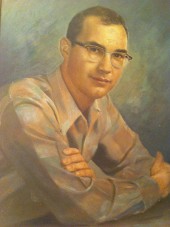 August 10, 2008.
August 10, 2008.
The series of articles over the years on Seattle’s gay history have been good.
The one in the July 25th issue of Seattle Gay News is interesting as it tells us how one person went from being an “innocent” to being an activist and working to educate people on homosexuality and the need for civil/equal rights.
Don Paulson does a great job in “Gay Love in the Peace Corps” of letting us feel how young Patrick Haggerty journeyed from being a Peace Corps person who didn’t understand his feelings (and in a sense is happy he was forced to face them after being kicked out of the corps, even though at the time he missed the co-worker he loved, and the job they were doing). He went on to serve mankind as an open homosexual.
Haggerty had a supportive mother, that helped, and while he got no real help from the hospital he went into, a nurse there did the best thing possible. She said, “Listen up. One, you’re gay. Two, you don’t belong here. No one in this hospital has anything for you…you should leave this hospital and figure it out on your own.” He faked a cure and got out.
Beautiful irony: He went immediately from being a patient to being a psychiatric case worker. And we, the community/movement, got a gay libber, an artist, musician, and a songwriter for the earliest openly gay LP, Lavender Country — which was recently archived in the Nashville Country Music Hall of Fame. (Music historian Chris Dickinson describes Haggerty as the “lost pioneer of gay country music.”)
Truly inspirational.
And then, in “General Gayety,” we have the humor of Leslie Robinson who talks about the United Methodist Church (my tradition) and its struggle with homosexuality and how some ministers in California are doing same-sex marriage despite the “rules” of the church. To quote her:
In other words, Methodist ministers are making matrimonial mischief. Miscreants are misbehaving by marrying members, making a mockery of Methodist mandates. Mercy.
I love it! (General Gayety, indeed.)
And the letter (thanks for using mine) of “Buzz Flowers” Callaway says much too, when he was asked by some one about being gay— “Does it really matter?”
Amen.

